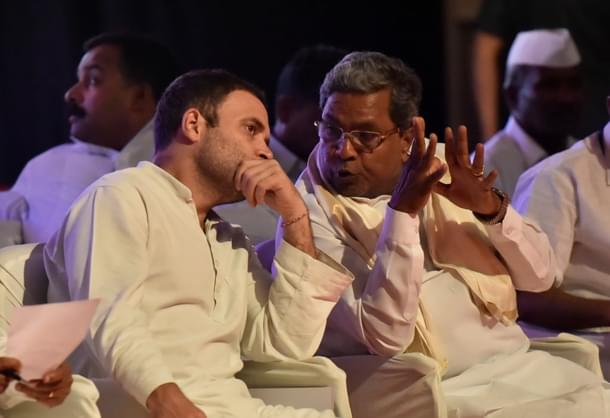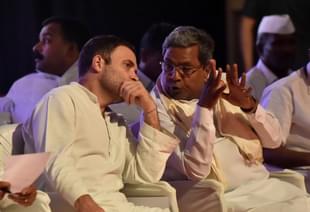Politics
Karnataka's Caste-astrophe: Rahul's Census Gambit Has Already Backfired
Swarajya Staff
Dec 27, 2023, 11:03 AM | Updated 02:52 PM IST
Save & read from anywhere!
Bookmark stories for easy access on any device or the Swarajya app.


In the run-up to the recently concluded round of assembly elections, Congress leader Rahul Gandhi claimed that his party will conduct a caste census within two hours of coming to power in the Lok Sabha elections 2024.
"Today I promise every OBC youth that a caste census will be done within two hours of our party coming to power in India. If we win in Chhattisgarh, we will do a caste census here," he said at a public rally in Chhattisgarh's Bastar region.
Terming the idea of caste census a "revolutionary and life-changing step for the people", Gandhi reiterated his pitch in another election rally in Madhya Pradesh with the slogan of "jitni abaadi, utna haq"
"After coming to power in the state, the first thing to be done is conducting a caste census to know the exact number of OBCs in Madhya Pradesh. It is like an X-ray which will reveal all (number of other backward class) and accordingly policies will be framed for their welfare," he said.
However, the ploy to latch on to the caste census plank failed miserably in the assembly elections in the bipolar states of Madhya Pradesh, Rajasthan and Chhattisgarh. The attempt to wean away non-dominant OBCs (Other Backward Castes) from the BJP fell flat as the saffron party appears to have achieved Lok Sabha elections level of consolidation among General Category and OBC voters.
Even as Rahul Gandhi attempts to tout the caste census in Bihar by the Nitish Kumar-led government (in which his party is a minor ally) as the shape of things to come, in Karnataka, where the census was conducted during the earlier Congress government, more than eight years ago, the report is yet to see the light of day.
Karnataka CM Siddaramaiah attempts to revive shelved 2015 caste survey
Emboldened by an electoral win in the May 2023 assembly election and the party's national leadership suddenly embracing his old idea in a big way, Karnataka CM Siddaramaiah wasted no time in reviving the concept of caste census.
Siddaramaiah was among the senior Congress leaders who immediately endorsed Rahul Gandhi's announcement that a nationwide caste census would be commissioned if his party won the Lok Sabha polls.
The Social and Educational Survey, commonly called the "Caste Census", was conducted in Karnataka in 2015 when Siddaramaiah was the Chief Minister. The Karnataka State Commission for Backward Classes (KSCBC) conducted the survey at an estimated cost of Rs 185 crores.
On multiple occasions, the Siddaramaiah-led government said it would accept the 2015 caste survey report. The CM also added that his government plans to reconfigure the reservation matrix in the state based on the report.
Siddaramaiah has advocated for a caste survey since 2005, when he was Deputy Chief Minister in the Congress- Janata Dal (Secular) coalition government.
After his defection from Janata Dal to Congress, Siddaramaiah tried to enhance his political stature by constantly projecting himself as the 'undisputed leader' of a social coalition in Karnataka broadly termed AHINDA, an acronym for the Kannada words Alpasankhyataru (Minorities), Hindulidavaru (Backward Classes) and Dalitaru (Dalits). He has assiduously cultivated various organisations, activists and leaders belonging to this grouping.
Siddaramaiah belongs to the Kuruba caste, the fourth largest social bloc in the state after Lingayats, Vokkaliga and Muslims.
Siddaramaiah and his supporters have long believed that the caste survey will help them politically as it will serve as a tool to undermine the clout wielded by Lingayat and Vokkaliga communities. Siddaramaiah and his supporters calculate that publishing the survey will consolidate his position as the undisputed leader of Backward Classes in the state and even catapult him as a viable national face.
Per conventional estimates, Lingayats constitute 17 per cent of the state population, while Vokkaligas account for 15 per cent. These figures are contested since India has had no caste-based census since 1931.
According to those privy to the 2015 caste survey, the combined population of Lingayats (mainly influential in northern Karnataka) and Vokkaligas (primarily concentrated in 11 districts in Old Mysore region and other regions of south Karnataka) is between 25 and 28 per cent of the state's population.
AHINDA ideologues maintain that Lingayats and Vokkaligas achieve political representation at all levels that far exceed their demographic strength thanks to their powerful social and economic strength.
The 2023 assembly elections in the state saw the continued dominance of the two major communities. 55 Lingayats (almost 25 per cent of the assembly strength) and 44 Vokkaligas were elected to the state assembly. In the 2018 state assembly,100 out of 224 legislators across parties were from the two dominant communities (58 Lingayat MLAs, 42 Vokkaligas)
Out of Karnataka's 23 chief ministers so far, 16 of them have been from either the Lingayat or Vokkaliga community.
Stiff Opposition from within Congress to the caste census
The CM's attempt to stir the caste cauldron has faced stiff resistance from within. Several members of Siddaramaiah's cabinet, too, opposed publishing the findings of the survey.
Deputy Chief Minister D.K. Shivakumar and other Vokkaliga Ministers signed a petition against the report in November, saying that the census will foment fault lines within the state and will cause severe damage to the party's electoral prospects.
"Many legislators have expressed misgivings that caste census has not been conducted properly. There have been complaints that enumerators have not gone house-to-house as part of the survey. Every community seeks rights as per their population. Even scheduled castes and tribes seek rights and allocation as per their population," Shivakumar remarked.
Even as Rahul Gandhi went to town with his "jitni abaadi, utna haq' plank, Congress president Mallikarjun Kharge was cornered by the BJP members in the Rajya Sabha over Shivakumar opposing the release of the census data in Karnataka.
A visibly embarrassed Kharge maintained that he was committed to the advocacy of OBC rights and claimed that the "BJP and Shivakumar were opposed to the census". The "upper castes are united over this", Kharge had remarked.
Two influential social organisations—Veerashaiva Mahasabha and Vokkaligara Sangha (the leading representative organisation of the Vokkaliga community)—also came out strongly against the caste census.
The Vokkaligara Sangha pointed out that the report was incomplete as it claims to have covered the 5.4 crore population of the state, and Karnataka's official number stands at 6.4 crore. "Accepting the report will be an injustice towards Vokkaliga community," stated the Sangha.
Key Lingayat leaders from the Congress—Shamanur Shivashankarappa (also the president of All India Veerashaiva Mahasabha), minister M.B. Patil and Eshwar Khandre—asked the state government to reject the Kantharaju Commission findings as it was not carried out "scientifically".
In its 28th convention this Sunday (December 24), the Veerashaiva Mahasabha urged the Siddaramaiah-led Congress government not to accept the socio-economic survey by the Kantharaju Commission and instead hold a fresh study on a 'scientific' basis.
The Mahasabha also said that since the survey report is now eight years old, it would not be ideal to accept the caste survey report and instead a fresh survey should be conducted.
Limited Options For Siddaramaiah
Sensing significant discord within the party and fearing major backlash from dominant communities in the upcoming Lok Sabha polls, Siddaramaiah said that the government's plan to accept the caste census report would be deferred, attributing it to a part of the survey's document gone missing.
The state government also extended the tenure of the current chairman of the Karnataka State Commission for Backward Classes, K. Jayaprakash Hegde, as the work on the survey report has yet to be completed. Incidentally, Siddaramaiah had previously claimed that the report was complete.
Congress's Karnataka dilemma underscores the limits of cynical use of caste politics without understanding the deeper implications of such an exercise.
Given the wide divergence of the OBC population thrown up by official sample surveys ranging from 41 per cent to 46 per cent between 2015-16 and 2021-22, one could argue that there is a case for arriving at an accurate number. There is also a consensus that the dominant group within OBCs disproportionately garner quota benefits. The Modi government has already sought to address this issue by constituting the Justice Rohini Commission in 2017.
Having exhausted its political arsenal against BJP and Prime Minister Narendra Modi previously, Rahul Gandhi and Congress thought they had hit upon a 'radical' idea to mount a serious challenge by mooting the idea of 'caste census'. But the electorate seems to be looking at the 'caste census' ploy as a cynical attempt to foil the unity of Hindus across India and weaponising caste for a divisive 'split and conquer' plan.





